News & Events in Belarus
Belarus president recounts problems in law enforcement
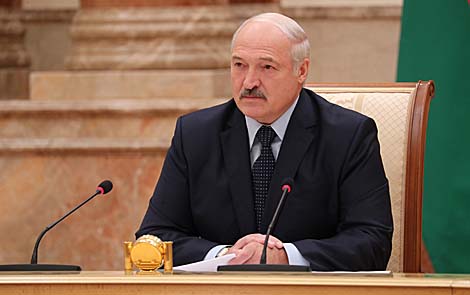
MINSK, 20 August (BelTA) – Belarus President Aleksandr Lukashenko highlighted problems in matters of law enforcement during the government conference held on 20 August to discuss the quality of crime detection and investigation by law enforcement agencies, BelTA has learned.
The head of state noted that the day before he had instructed the relevant bodies, which are in charge of overseeing the observation of laws and reporting an objective picture to the president, to thoroughly investigate the subject of the discussion. “I’ve decided to inform not only you but the public about what is going on in the law enforcement system. About the main issues without going into details although there is a bunch of examples. About certain things relating to how investigation and prosecution bodies observe procedures. Although the document I’ve received is classified, I’ve decided to declassify it in a way to avoid certain details,” the Belarusian leader stated.
In his words, despite the improvement of various results in the work of Belarusian law enforcement agencies, including better interaction between them, certain negative phenomena and problems in the organization of pre-trial procedures have not been eradicated.
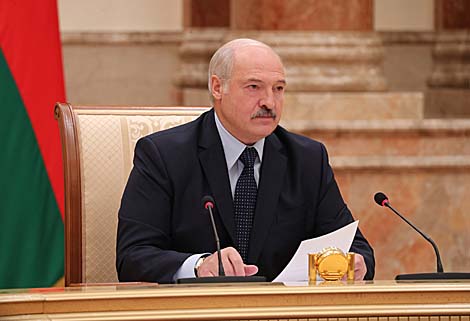 Quality of preliminary inquiries and preliminary investigations
Quality of preliminary inquiries and preliminary investigations
The head of state mentioned the low quality of work in this sphere. The practice of prosecutor’s oversight indicates that the main deficiencies in the work of law enforcement bodies include superficial treatment of crime incident reports and the poor awareness of operatives about criminal manifestations in their areas of responsibility. As a result offenders act with impunity and commit even more serious crimes. Aleksandr Lukashenko also mentioned lengthy preliminary inquiries, violations of the procedure and conditions of search and retrieval actions, including unjustified warrants. “Dragging feet in the process of finding out the identity of culprits is particularly inadmissible,” the president stressed.
The Office of the Prosecutor General attributed the state of affairs primarily to ineffective oversight over the legal procedure in the course of handling statements and crime incident reports at the level of cities and districts. Heads of these units rarely authorize additional checks. The same reasons are to blame for ineffective counteraction of economic crimes by financial investigation bodies of the State Control Committee, Aleksandr Lukashenko stated.
Performance reports from the Financial Investigations Department are often skewed with citations of as large sums of unpaid taxes as possible instead of the desire to prevent economic crimes, prevent commercial entities and individuals from gaining illegal revenues by eliminating the reasons and conditions conducive to unlawful activities.
The Office of the Prosecutor General also mentioned essential negative trends in the work of investigation bodies. Failures of investigators to take proper measures to collect and evaluate evidence were mentioned. In some cases such evidence gets invalidated as a result.
Investigators were also criticized for poor handling of the required paperwork, for the lack of the necessary information and details in the papers.
Poor quality of initial urgent investigative actions was mentioned. Lack of effort to recover damages caused by the crimes was noted.
As a result, in 2017 – H1 2019 the prosecution presented new charges or organized the collection of additional evidence in 400 cases against 683 people.
“Apart from that, grave procedural errors committed by investigators resulted in exonerating rulings due to unjustified accusations,” the president said.
In 2018 prosecution returned 631 criminal cases for additional pre-trial investigation, nearly 12% up from 2017. The trend continued in H1 2019. Prosecution returned 363 criminal cases for additional pre-trial investigation, 21% up from H1 2018. The facts indicate the poor quality of work of Belarusian investigators, Aleksandr Lukashenko noted.
In his words, Belarusian courts respond to violations of the legislation committed by investigation bodies. In 2018 the courts issued 660 interlocutory rulings addressed to investigation bodies. The same number was registered in 2017. In H1 2019 the figure stood at 372. While the number of cases processed by courts rises, the share of interlocutory rulings is on the rise as well.
Lengthy preliminary investigations were mentioned. Untimely actions of procedural constraint and actions to find the accused were mentioned. Sometimes people, whose whereabouts were known, were put on the wanted list.
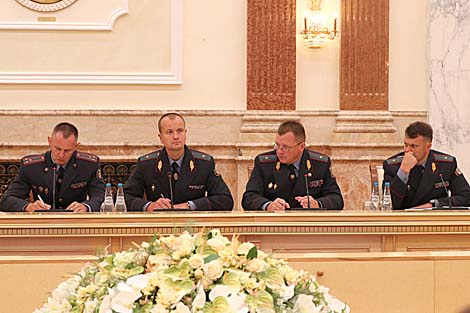 Abuse of authority
Abuse of authority
Aleksandr Lukashenko mentioned the abuse of authority. “Well, here is a thing: law enforcers are accused of the things they are supposed to fight,” the head of state noted.
Aleksandr Lukashenko said that the most widespread procedural violations had been listed upon his instructions. The number includes coercion of participants of the criminal process: suspects, accused, lawyers, and judges.
“For instance, if a poorly made criminal case starts falling apart at some stage – the lawyer, some witness, or someone else fails to see the investigators’ point of view, coercion comes into play, including coercion of judges,” the president noted.
The president also mentioned the forgery of evidence when procedural documents and conclusions of experts contain untrustworthy data. “They make forgeries in order to obtain the necessary results. I want you, [Head of the Belarus President Administration] Natalya Ivanovna [Kochanova], to write it down. Most uncompromising decisions will have to be made in response to all of these problems!” the Belarusian leader stressed.
“They interfere with investigations into criminal cases and inquiry reports. I’ve already mentioned efforts to coerce people into giving the necessary testimony or renouncing claims. They artificially enable conditions conducive to unlawful activities in order to suppress them later,” the head of state added.
The president attributed these actions to motives of financial gains and the desire of officials to meet departmental quotas and statistics targets. “How absurd!” the president was indignant.
In 2017 – H1 2019 Belarusian courts convicted 24 former police and investigation officers for committing unlawful actions in the course of detecting and investigating criminal cases. “Only a handful but it is only the beginning. I am warning you. More pressure will be put on all of these issues after today’s historical conference. As I’ve told the farmers, someone’s eyes will pop out if you don’t change your attitudes,” the Belarusian leader added.
Aleksandr Lukashenko pointed out that heads of agencies take insufficient measures to remove causes and conditions of the detected violations and negative trends.
Aleksandr Lukashenko continued that the general public is concerned about facts of excessive use of force and special equipment against citizens. “Special units are dispatched, particularly police units. In particular, the SWAT team Almaz. Such actions only disgrace the guys. It is necessary to pay more attention to these special units. We have only four or five of them. Stricter oversight is required,” the head of state noted.
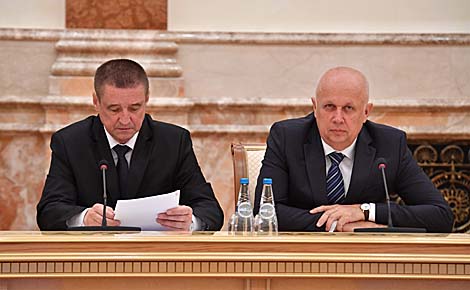 Opening of criminal investigations and measures of restraint
Opening of criminal investigations and measures of restraint
The opening of criminal investigations and the practice of using pretrial detention as a measure of restraint are a reason for concern.
“The Office of the Prosecutor General has registered an improvement of performance of investigative agencies in the course of opening a criminal case. The falling number of procedural decisions made by these agencies and reversed by prosecutors is one of the indicators to judge the quality of work. At the same time the number of cases opened by preliminary investigation bodies is on the rise. The fact that such criminal cases are later closed due to exonerating circumstances, in particular, due to the lack of material elements of offence, is one of the reasons why opening such investigations is unjustified,” the head of state noted.
In 2017 units of the Investigative Committee alone closed about 4,000 criminal cases due to exonerating circumstances. As many as 4,500 cases were closed in 2018 and 2,150 cases in H1 2019.
“We’ve recently seen an increase in the number of investigations into corruption crimes. One of the negative characteristic manifestations is that people face criminal charges based on formal signs of criminal actions. As a result, no material elements of offence are found or the consequences of such actions are insignificant. I don’t know who needs such investigations,” Aleksandr Lukashenko said. “The opening of criminal cases against officials is often broadly covered by mass media. Their consequent termination due to exonerating circumstances triggers a negative response from the public and represents a reason to criticize law enforcement agencies and the government as a whole.”
“Attempts to improve performance through increasing statistics data on the number of crimes solved in fact rule out the possibility of using preventive measures, including based on Decree No.5 on toughening requirements towards the executive staff and workers of organizations,” the head of state said.
Pretrial detention is still widely used as a measure of restraint. In 2017, more than 10,000 out of 17,100 detained persons were taken into custody. The figures for 2018 stood at 9,500 and 16,800 respectively. In H1 2019, some 4,500 out of 8,500 detained were taken into custody. As a rule, such measure is applied to prevent the person from fleeing from prosecution and also to foreign nationals, stateless persons and persons with a previous criminal record.
There are numerous cases when the Office of the Prosecutor General, at the request of investigative units, extended the length of detention beyond 12 months. In H1 2019 alone, such measure was applied to more than 58 people. “The need to extend the term is mainly justified by the large volume of investigative activities. At the same time, there are facts of improper organization of investigative measures. The data on the number of persons in respect to whom the preliminary investigation has been discontinued on rehabilitating grounds, indicates a lack of control by law enforcement authorities over the relevance of using detention as a measure of restraint,” said Aleksandr Lukashenko.
“Simply speaking, a person is placed into a pretrial detention facility. Time goes on, no evidence is found and the person is released. In 2017, 31 such cases were discontinued on rehabilitative grounds. Thirty-one persons suffered. In 2018, 27 such persons were released from custody. The length of this measure being applied is of particular concern, especially in respect to persons who saw their preliminary investigation terminated on exonerating grounds. The term of detention in some cases exceeded six months. Who has been held accountable for this?” the head of state said.
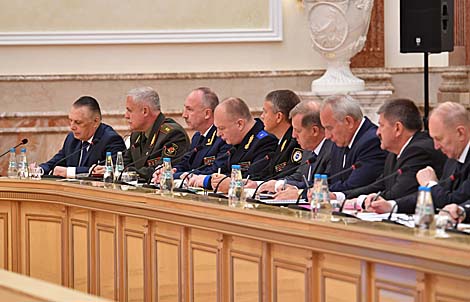 Prosecutor’s oversight
Prosecutor’s oversight
Aleksandr Lukashenko also spoke about the lack of effective prosecutor’s oversight. “The meeting which the president is chairing today should have been held by the prosecutor general more than once a year,” he said.
According to the Supreme Court, the prosecutor’s oversight over the enforcement of the law is poor in respect to pretrial proceedings. “I cannot but agree with it. Prosecutors often send criminal cases to court without proper verification and analysis of all the evidence available, while state prosecutors support the charges in full,” the president said.
In 2018, 25 criminal cases were sent back to the investigation to remove obvious obstacles to their consideration by courts. “Numerous errors and shortcomings of pretrial proceedings are corrected directly at the hearing and not by prosecutors before they are sent to court. As a result, poor prosecutor’s supervision entails a logical decrease in the quality of preliminary investigation, which in turn, leads to acquittals,” Aleksandr Lukashenko said.
According to judicial statistics, 50 acquittals were ordered in H1 2019, 80 in 2018, and almost 100 in 2017. In most cases, the basis for acquittal was the absence of crime in the act and the lack of evidence of participation in the commission of the crime. Since 2017 five persons have been acquitted of charges of murder.
The number of persons partially acquitted of the indictment, including that for committing grave and especially grave crimes, remains high. In 2018, their number increased to 208 from 197 in 2017. The figure made up 60 in H1 2019.
“The grounds for revising the charges in those cases, according to the judges, were insufficient evidence as well as improper application of the criminal law,” the head of state said.
The head of state also said a few words about judges. “A practice has been established that judges need a bunch of evidence and a number of facts of crimes in order to make some decision. The practice won’t do! One crime or a crime and a half are enough to punish the miscreant,” Aleksandr Lukashenko believes.
“You should see how Americans work. I’ve attentively studied their experience and practice. We shouldn’t copy some of their practices like wiretapping people for no reason at all. But if a government agency becomes too cozy with some swindlers or businessmen and it is a fact, they get jailed. If there is a fact among evidence, courts should make the relevant ruling instead of demanding additional facts from investigators. Naturally, people should be punished for something concrete. Nothing more nor less,” the Belarusian leader stressed.
According to the Office of the Prosecutor General, courts sometimes pronounce non-guilty verdicts not because their interpretation of sufficient evidence differs from that of investigation bodies, but because of procedural violations committed by investigators in the course of collecting evidence, apprehending suspects, and ensuring their right to protection.
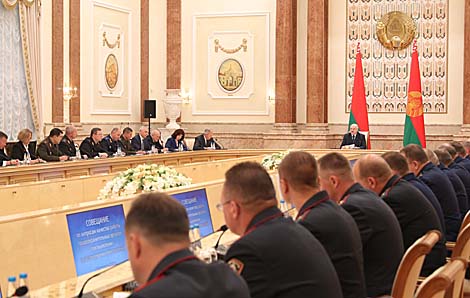 Departmental quotas to evaluate performance
Departmental quotas to evaluate performance
The president also slammed the practice of departmental quotas in evaluating the performance of various law enforcement and investigation bodies. “This practice must be eradicated by all means. Just do it. It has to be done via legislation. Otherwise, they will still stick to departmental quotas and will boast about their greatness purely on the basis of the number of criminal cases that have been investigated,” the head of state said.
In his words, the main reason that prompts law enforcement officials to make unlawful decisions within the framework of the criminal procedure is the ineffective system used to judge their performance. It encourages the people that take instructions from them to find ways to meet assessment criteria. Ineffective oversight over the processes inside these agencies was mentioned as well.
“If law enforcement officers tend to care about statistics alone, they tend to disregard their duty to secure law, protect rights and interests of citizens, and respond to violations of the law. They tend to artificially demonstrate they work hard by meeting departmental quotas and statistics,” the Belarusian leader stressed. “Certainly, we will keep statistics in mind but we have to find out what statistics is based on: artificial figures or indicators of real work in the law enforcement system.”
In 2018-2019 abuses of authority were registered in the fight against drugs smuggling. Instead of systemic fight against illegal drugs law enforcement agencies were hell bent on detecting as many crimes as possible. “They focused on numbers instead of finding out how major batches of drugs are smuggled into the country and get distributed. Certainly, it is much easier to find some homeless person with drugs or better yet plant the drugs on him and file the report. Useless,” Aleksandr Lukashenko noted.
According to the State Security Committee (KGB), not only officers of police and investigative units commit blatant violations. While working at crime scenes, some specialists of the State Forensic Examination Committee collected unrelated traces and actually forged evidence in order to meet departmental quotas, which require collecting a certain number of traces.
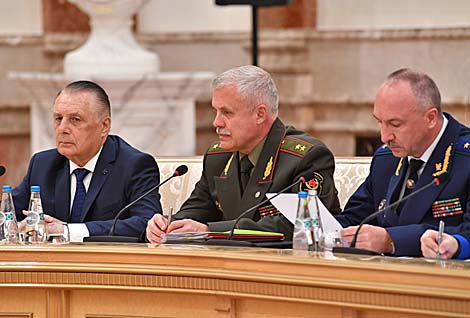 Corruption and hard evidence
Corruption and hard evidence
Aleksandr Lukashenko also spoke at length about the need to have sufficient evidence in the investigation of corruption crimes. The Supreme Court had also indicated there are problems in this regard. Practice demonstrates that charges often rely on someone’s confused recollections of distant past while bribe taking has not been properly registered.
Such approaches to proving the guilt of the potential bribe taker substantially inflate the risk of him or her being framed, including by competitors, the president remarked.
The head of state praised the KGB’s work in this regard: all the high-profile criminal cases involving bribe taking are based on concrete facts. As the head of state wanted it to be. “You have to record the audio, video of a person taking a bribe. Such evidence is irrefutable. What do we have instead when someone vaguely recalls giving a bribe? Police responds by taking the accused into custody. Such facts have to be proven irrefutably. Otherwise, slander and false accusations will become rampant,” the head of state said.
The president warned that the fight against bribe taking must continue unabated and the punishment of the guilty ones must not be softened. “But we must never punish the man, who is innocent. You’d better drop these criminal cases if you don’t see hard evidence,” he said.
The analysis of law enforcement practice indicates that it is difficult to come up with criteria of what sufficient evidence for such cases should be. However, it must be done, Aleksandr Lukashenko stressed.
Summing up results of the government conference, Aleksandr Lukashenko encouraged law enforcement agencies to work harder to protect legal rights of citizens. “In addition to acting as a purgatory you should be able to inform the president in time in order to protect people,” the head of state said.
“Judging from the things I’ve said, you have to agree with me that today’s is not another routine meeting hosted by the head of state. We have to make the relevant decisions on all the facts,” Aleksandr Lukashenko stressed.
Addressing top officials of the Belarus President Administration, Aleksandr Lukashenko said: “In addition to appointing personnel, you have to guard them. And swindlers and impostors must be removed from our ranks.”
“People have to be treated fairly! You yourselves may face the same situation as the people you sometimes illegally put pressure on. In conclusion I want law enforcement agencies to not only work effectively. I want quality work, smart work. Instead of the law, which cannot describe everything that may happen in life, you should be guided by fairness. Don’t squeezer people too much. On the other hand, give no quarter to scoundrels, miscreants, and bandits. Otherwise, stability in our society is out of question,” the president concluded.
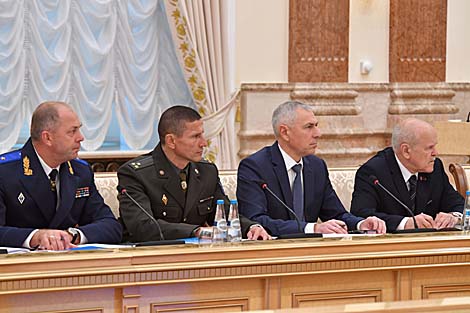







 print version
print version make home page
make home page add to bookmarks
add to bookmarks

